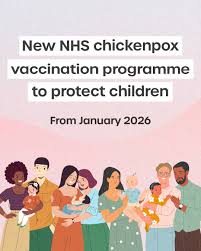The NHS Chickenpox Vaccine: Importance and Impact

Introduction
The chickenpox vaccine, which is part of the UK’s NHS vaccination programme, plays a crucial role in reducing the incidence of this common childhood disease. Chickenpox, caused by the varicella-zoster virus, can lead to serious complications, especially in infants, adolescents, and adults. Therefore, understanding the importance of the NHS chickenpox vaccine is essential for parents and guardians looking to safeguard their children’s health.
Current Vaccination Guidelines
As of October 2023, the NHS recommends that children aged between 12 to 18 months receive the chickenpox vaccine as part of their routine immunisations. A second dose is recommended for children aged 3 to 5 years, ensuring they develop effective immunity against the virus. The vaccine is offered for free within the NHS system, reflecting the UK’s commitment to public health and disease prevention. In 2022, the vaccine coverage rate reached approximately 90%, indicating strong participation among parents in ensuring their children are vaccinated.
Impact on Public Health
The introduction of the chickenpox vaccine into the NHS schedule has produced measurable benefits. According to Public Health England data, cases of chickenpox have declined by 85% since the vaccine became widely available. This decline has reduced hospital admissions and lowered the burden on healthcare systems. Additionally, older population groups have seen a decrease in shingles cases, as the varicella-zoster virus typically stays dormant in the body and can reactivate later in life. Furthermore, widespread vaccination contributes to herd immunity, protecting those who cannot be vaccinated due to medical reasons.
Challenges and Ongoing Efforts
Despite the vaccine’s success, challenges remain. Vaccine hesitancy linked to misinformation continues to pose a barrier to achieving higher vaccination rates. The NHS, in collaboration with healthcare providers, is actively working to address these fears through public awareness campaigns that emphasise the vaccine’s efficacy and safety. As a result, health authorities are optimistic about further increasing uptake and ultimately delivering better health outcomes for children across the UK.
Conclusion
The NHS chickenpox vaccine is a significant component in the fight against viral diseases, contributing to lower infection rates and better health for current and future generations. As medical professionals encourage parents to ensure their children are vaccinated, the focus is not only on individual health but also on broader community wellbeing. Looking ahead, continued education on the benefits of vaccinations will be critical for maintaining public health standards and combating preventable diseases.








